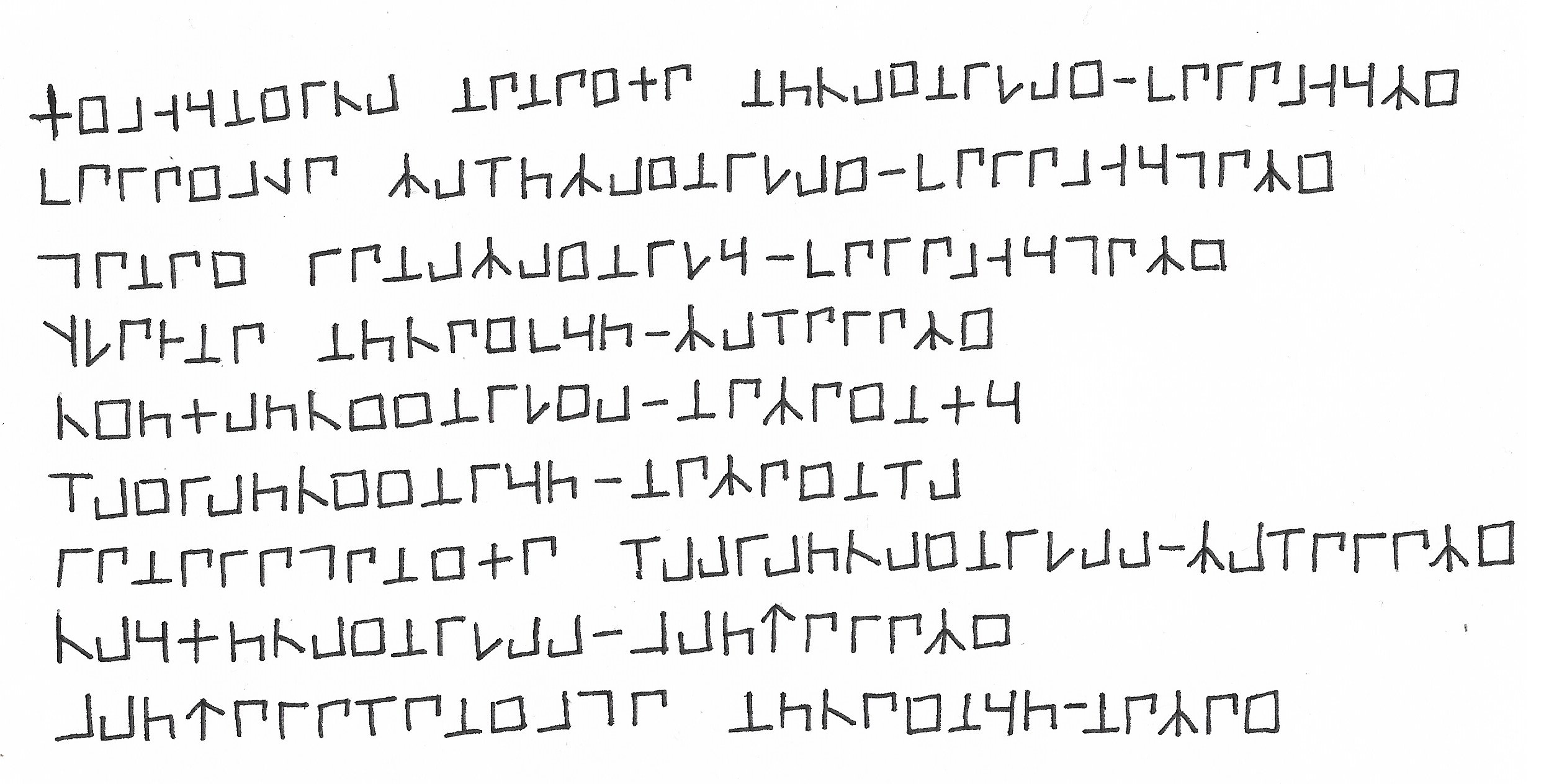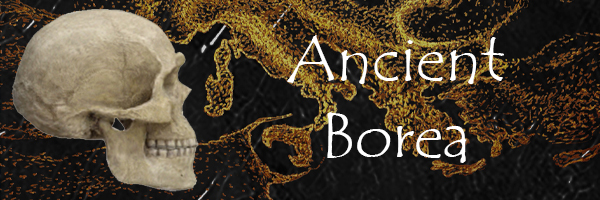The Geneticon
Copyright © 1999-2020 C.E. by Dustin Jon Scott
Introduction
The Geneticon is the primary book of origins and lineages for the Palæoboreanic people.

First Paragraph Full Text: Dombunokra niniodi neraonkyao-ngikimbulo. Ngikinomwi latelaonkyao-ngikimbupilo; pinio kinalaonkyu-ngikimbupilo. Vyigni, neriongue-latikilo. Roedaeroonkyoa-nilionda taokaeroonkyue-nilionta. Kinikipinodi taakaeraonkyaa-latikilo. Rauderaonkyaa-maesikilo. Maesikitinompi nerionue-nilio.
First Paragraph Full Translation: In the time before the great cause/origin of all things, certainly must have existed back in the day a great nothingness. This nothingness must have been in those days perfect in its nothingness; everywhere the same this great nothingness had to be. However, it is known, perfection does not endure forever. All things must someday begin to erode and all things must inevitably evermore die. The perfection of this symmetry back then certainly broke. Chaos raged forth. Within that chaos all things endure.
Breakdown:
First Sentence: Dombunokra niniodi neraonkyao-ngikimbulo.
First Sentence Gloss: Dombunikra = do- (cause/origin) + -mbu- (great; big) + -n- (objective) + -o- (gerund, adjective, or concept) + -kra (in the time before); niniodi = ni- (third person pronoun) + -n- (objective) + -i- (inanimate object) + -o- (all) + -di (of); neraonkyao = n- (to be) + -e- (intransitive) -r- (non-stative verb) + -ao- (back in the day; long ago) + -nky- (deductive) + -ao (habitual; “used to”); ngikimbuli = ngi (nothing; negative; zero) + -ki (-ness; -ity) + -mbu- (great; big) + -l- (nominative) + -o (gerund, adjective, or concept).
First Sentence Translation: In the time before the great cause/origin of all things, certainly must have existed back in the day a great nothingness.
Second Sentence: Ngikinomwi latelaonkyao-ngikimbupilo; pinio kinalaonkyu-ngikimbupilo.
Second Sentence Gloss: Ngikinomwi = ngi- (nothing; negative; zero) + -ki- (-ness; -ity) + -n- (objective) + -o- (gerund, adjective, or concept) + -mwi (with itself); latelaonkyao = lat- (perfected; completed) + -e- (intransitive) + -l- (adjective or stative verb) + -ao- (back in the day; long ago) + -nky- (deductive) + -ao (habitual; “used to”); ngikimbupilo = ngi- (nothing; negative; zero) + -ki- (-ness; -ity) + -mbu- (great; big) + -pi (proximal demonstrative) + -l- (nominative) + -o (gerund, adjective, or concept); pinio = pi- (place) + -n- (objective) + -i- (inanimate object) + -o (all); kinilaonkyu = kin- (same) + -i- (descriptive) + -l- (adjective or stative verb) + -ao- (back in the day; long ago) + -nky- (deductive) + -u (durative); ngikimbulipi = ngi- (nothing; negative; zero) + -ki- (-ness; -ity) + -mbu- (great; big) + -pi (proximal demonstrative) + -l- (nominative) + -o (gerund, adjective, or concept).
Second Sentence Translation: This nothingness must have been in those days perfect in its nothingness; everywhere the same this great nothingness had to be.
Third Sentence: Vyigni, neriongue-latikilo.
Third Sentence Gloss: Vyigni = vyi- (alternate) + -gni (known); neriongue = n- (to be) + -e- (intransitive) + r (non-stative verb) + -io- (kind-level description) + -ng- (negative) + -ue (continuative); latikilo = lati- (perfect; complete) + -ki- (-ness; -ity) + -l- (nominative) + -o (gerund, adjective, or concept).
Third Sentence Translation: However, it is known, perfection does not endure forever.
Fourth Sentence: Roedaeroonkyoa-nilionda taokaeroonkyue-nilionta.
Fourth Sentence Gloss: Roedaeroonkyoa = roed- (erode; eat away at) + -ae- (middle or mediopassive voice) + -r- (non-stative verb) + -oo- (distant future; someday) + -nky- (deductive) + -oa (inceptive); nilionda = ni- (third person pronoun) + -l- (nominative) + -i- (inanimate object) + -o- (all) + -nda (correlative “and”); taokaeraondyue = taok- (to evermore end; to end more and more) + -ae- (middle or mediopassive voice) + -r- (non-stative verb) + -oo- (distant future; someday) + -nky- (deductive) + -ue (continuative); nilionta = ni- (third person pronoun) + -l- (nominative) + -i- (inanimate object) + -o- (all) + -nta (coordinating “and”).
Fourth Sentence Translation: All things must someday begin to erode and all things must inevitably evermore die.
Fifth Sentence: Kinikipinodi taakaeraonkyaa-latikilo.
Fifth Sentence Gloss: Kinikipinodi = kini- (same) + -ki- (-ness; -ity) + -pi- (proximal demonstrative) + -o- (gerund, adjective, or concept) + -di (of); taakaeraonkyaa = taak- (to break) + -ae- (middle or mediopassive voice) + -r- (non-stative verb) + -ao- (back in the day; long ago) + -nky- (deductive) + -aa (semelfactive); latikilo = lati- (perfect; complete) + -ki- (-ness; -ity) + -l- (nominative) + -o (gerund, adjective, or concept).
Fifth Sentence Translation: The perfection of this symmetry back then certainly broke.
Sixth Sentence: Rauderaonkyaa-maesikilo.
Sixth Sentence Gloss: Rauderaonkyaa = raud- (to burn, erupt, or rage) + -e- (intransitive) + -r- (non-stative verb) + -ao- (back in the day; long ago) + -nky- (deductive) + -aa (semelfactive); maesikilo = maesi- (going in different directions) + -ki- (-ness; -ity) + -l- (nominative) + -o (gerund, adjective, or concept).
Sixth Sentence Translation: Chaos raged forth.
Seventh Sentence: Maesikitinompi nerionue-nilio.
Seventh Sentence Gloss: Maesikitinompi = maesi- (going in different directions) + -ki- (-ness; -ity) + -ti- (medial demonstrative) + -n- (objective) + -o- (gerund, adjective, or concept) + -mpi (within); nerionao = n- (to be) + -e- (intransitive) + -r- (non-stative verb) + -io- (kind-level description) + -n- (narrative) + -ue (continuative); nilio = ni- (third person pronoun) + -l- (nominative) + -i- (inanimate object) + -o (all).
Seventh Sentence Translation: Within that chaos all things endure.

